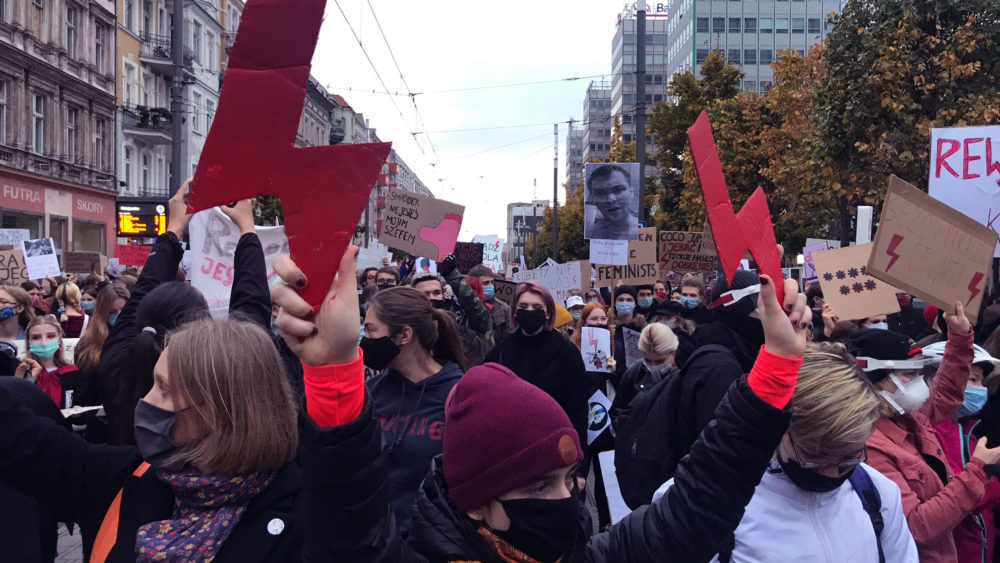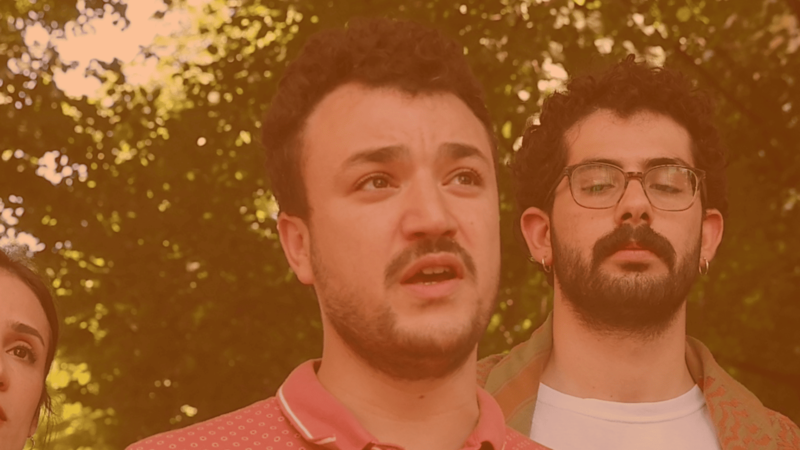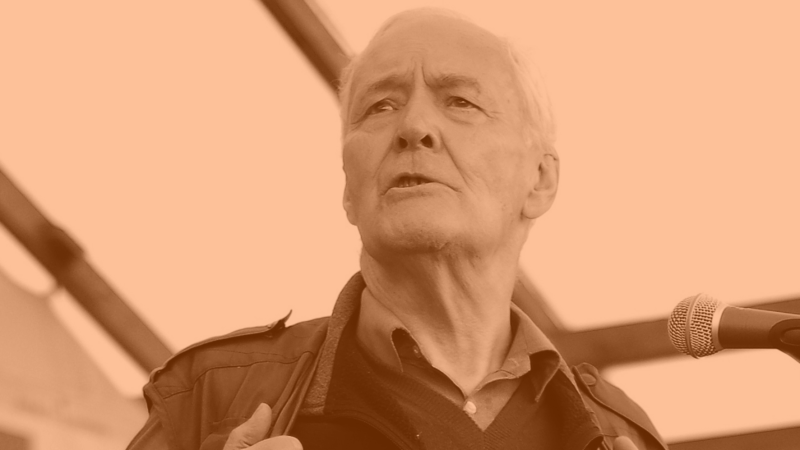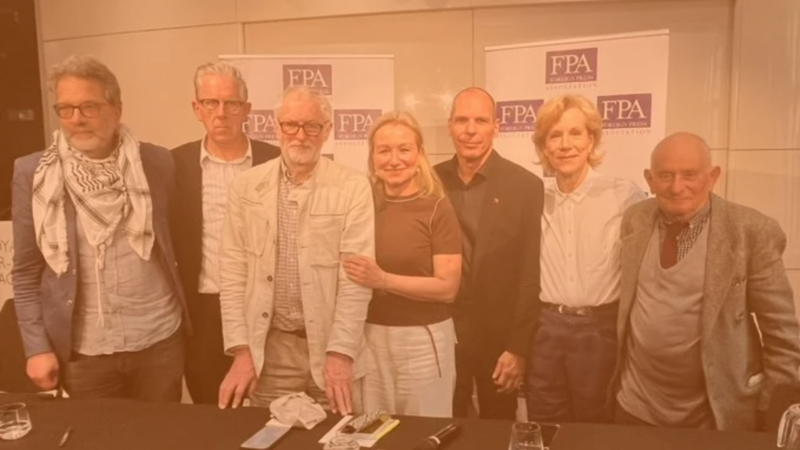Protests continue in Poland and abroad against Poland’s abortion ban
*inclusive of trans, queer and non-binary people
On 22 October, the Polish Constitutional Court banned one of the few remaining — and most common — legal grounds for abortion in the country. This decision has brought thousands of Poles to the streets over the last 10 days, with activists voicing their anger and carrying out hundreds of strikes in Warsaw and other corners of Poland.
These protests — the biggest seen in the country since the eighties — are taking place despite thinly veiled threats by Deputy Prime Minister Jarosław Kaczyński calling for violence against protesters, and escalating numbers of COVID cases in the country. Indeed, women’s rights groups behind the marches may now face prosecution as gatherings of more than five people are currently prohibited as a preventative measure against Coronavirus.
But pro-choice supporters are not giving up, and their disobedience is already paying off
The ruling, affecting over 10 million women of reproductive age, was scheduled to be formally published at the beginning of this week and therefore become legally binding. But as a result of the many justified protests, it has been delayed. The government is backing off and is calling for dialogue with opposition groups and lawmakers to find a solution. The people’s voice is being heard, at least for now.
Looking at the broader context, abortion had already been illegal in Poland, but it was at least permitted under three circumstances: in case of rape or incest, when the mother’s life is at risk, and in the event of severe and irreversible foetal defects. Three has now become two, with the PiS-controlled Constitutional Court declaring abortions falling within the third category unconstitutional.
The problem of this latest ruling is that around 98% of the over 1,100 legal abortions carried out every year are performed under the third exception. Since most terminations are now effectively prohibited, those pregnant will have to carry to term, unless they can afford going abroad to access abortion. Women’s groups estimate that between 80,000 and 120,000 Polish women already go to neighbouring countries every year, mostly to Germany, to terminate unwanted pregnancies. That number will now surely increase, whilst rates of unsafe, pseudo-medical, homemade abortions will as well.
Due to public pressure, the government is looking for a compromise, but does it go far enough? Polish president Andrzej Duda has proposed to continue to allow abortion for foetuses with life-threatening defects but ban it for disorders such as Down’s syndrome. Yet, this alternative follows the same rationale: it takes away the right of women to make decisions about their own bodies and how they want to live their lives. And pro-choice activists and the opposition are not likely to buy it.
This near-total ban on abortion is another manifestation of a war on women and their bodily autonomy
It is a violation of their right to health (physical and mental) and their fundamental right to be treated as equal beings. As women’s groups put it, women are being treated like living incubators. They are subject to an end, with no voice or decision. This is another form of violence.
And yet, this decision does not happen in a vacuum. Around the world, we are amidst an astonishing regression of women’s reproductive rights. In the US, Judge Amy Coney Barrett, a devout Catholic and staunch pro-lifer, became the newest addition to the Supreme Court last week, tipping the balance of power on the bench 6-3 in favour of Conservatives. This has the potential to further accelerate the race on abortion bans (in 2019 alone, a total of 26 abortion bans were enacted across 12 states in the US) and could even lead to overturning the landmark Roe v. Wade ruling.
Meanwhile, as half a million Poles have been raising their banners, both Poland and the US — along with more than 30 countries, representing over 1.6 billion people, and also including another EU member-state, Hungary — have signed an anti-abortion declaration; aka the Geneva Consensus Declaration.
The Polish Constitutional Court’s decision has of course been heavily criticised across Europe
After all, this assault on reproductive rights is just the latest regressive action taken by PiS, which has also seen the governing party attack judicial independence, free media and LGBTQIA+ rights. So far though, condemnatory words have failed to translate into effective action and the EU has not imposed any penalties against the country.
Pressure is mounting however, and some MEPs and governments are suggesting to withhold EU financial aid from Poland unless the government changes tack. But, will that happen, and if so, will Poland change course? So far any attempts to force the right-wing coalition to alter its position have proven unsuccessful. PiS leader Jarosław Kaczyński has indeed vowed that he will not succumb to any blackmail from Brussels and will “protect” Polish sovereignty tooth and nail.
The ruling has also been a rallying call to regressive political forces in Europe. It attacks Polish women’s ownership over their own bodies and rights, as much as it represents a threat for millions of people across EU member-states. It sets a precedent, and it does so at a time where the far-right, riding a wave of support from anti-abortion crusaders, is rising in Europe.
What has been achieved after years of women’s mobilization can be reversed in the blink of an eye if we don’t see this as a collective problem
Every one of us in Europe and around the world — especially women — must stand in solidarity with our fellow Poles. Decisions about the autonomy of our bodies and rights are not, and should not be, left in the hands of any sovereign state. This issue goes beyond national borders.
Nationwide protests have put enough pressure on the government to delay the ban, but should not we tackle the problem more proactively across Europe? If we want to preserve — and strengthen — reproductive rights, we need a united response as Europeans. We need a European solution.
While the European Union must be quick to take real action on this attack to its fundamental principles, we must consider other options that can more effectively tackle this regression.
DiEM25 stands for a Pan-European Convention on Reproductive Rights where EU member-states guarantee access to reproductive autonomy and sexual health
This Convention would sanction countries attacking strong foundations of women’s rights, just like Poland is doing, and others may be tempted to follow. Easy and legal access to abortion — including full medical, psychological and social care — would be binding for all countries, giving back to women, including trans, queer and non-binary people, the right to make decisions about their own health.
Poland’s abortion ban is another step towards women’s oppression, and a warning sign for all other women. But a coordinated European response can help us change course.
Read the statement by our movement’s Taskforce on Feminism, Diversity and Disabilities ‘We stand in solidarity with the women* of Poland’.
Photo Source: Codzienny Poznań on Twitter.
The views and opinions expressed here are those of the author and do not necessarily reflect DiEM25’s official policies or positions.
Do you want to be informed of DiEM25's actions? Sign up here















